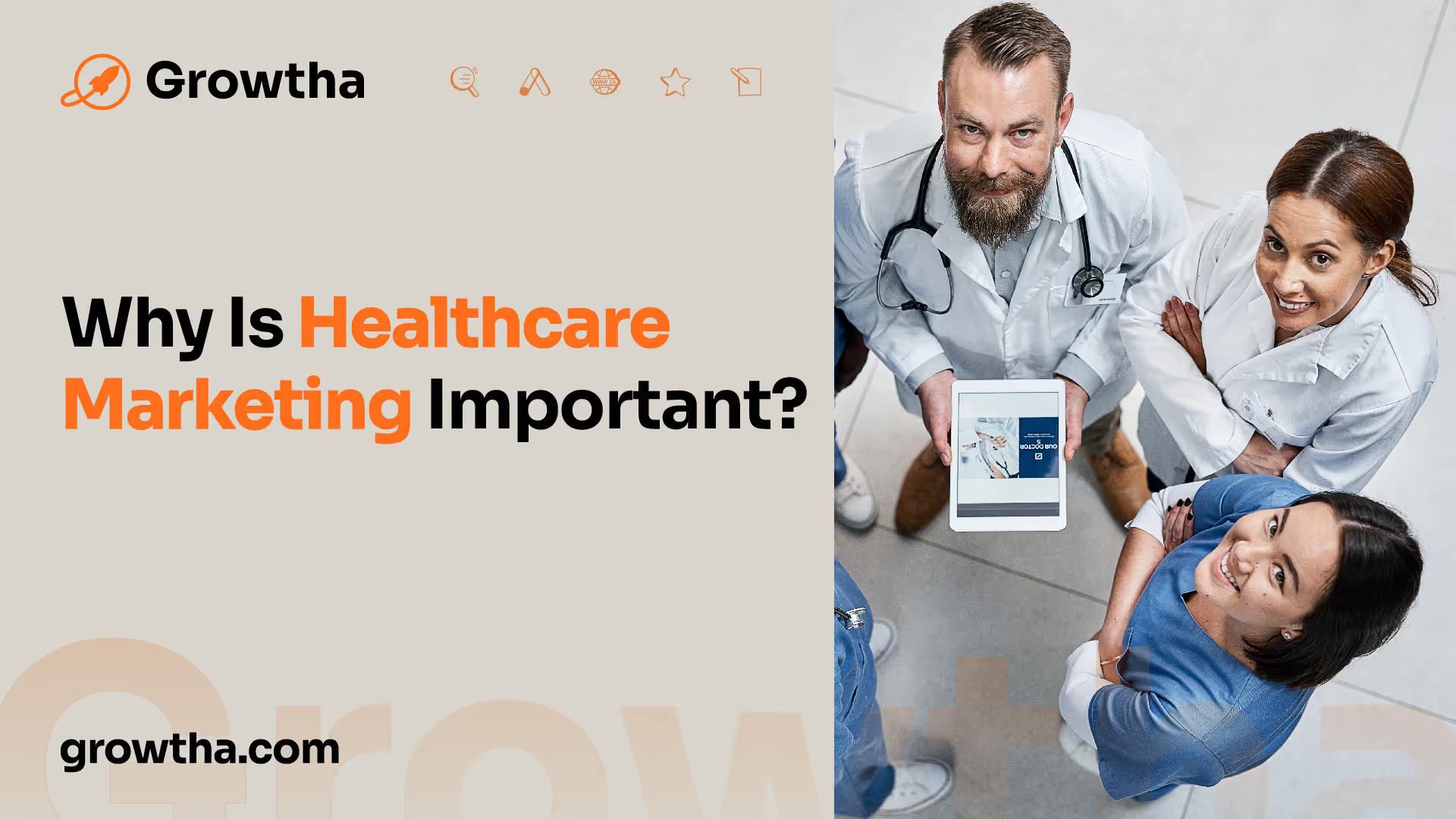Why Is Healthcare Marketing Important?
In the healthcare industry, effective marketing plays a vital role in various aspects, including building trust and credibility, as well as enhancing patient engagement and loyalty


Why Is Healthcare Marketing Important?
The Importance of Healthcare Marketing
In the healthcare industry, effective marketing plays a vital role in various aspects, including building trust and credibility, as well as enhancing patient engagement and loyalty.
Building Trust and Credibility
Trust is the cornerstone of effective healthcare marketing, serving as a crucial pillar for success in the industry. Establishing trust is essential for shaping patient behaviors, outcomes, and overall healthcare experiences [1]. When patients trust their healthcare providers, they are more likely to actively participate in their care, follow treatment plans, and adhere to medical advice. This trust fosters patient confidence and engagement, as they believe their providers have their best interests at heart and will provide suitable care and guidance.
Furthermore, trust plays a crucial role in the provider-patient relationship. Patients who trust their healthcare providers are more likely to maintain long-term relationships, leading to continuity of care. They are also more likely to comply with recommended treatments and preventive measures, resulting in improved health outcomes, reduced hospitalizations, and lower healthcare costs. Building trust and credibility is essential in the healthcare industry, and marketing efforts help healthcare organizations establish and maintain a positive image. By emphasizing expertise, experience, and commitment to patient care, healthcare marketing contributes to the establishment of a reputable and credible healthcare brand. This, in turn, leads to patient loyalty, positive word-of-mouth referrals, and operational efficiency derived from consistently high-quality care, ethical practices, and effective communication.
Enhancing Patient Engagement and Loyalty
Healthcare marketing plays a pivotal role in engaging patients and empowering them to take charge of their health. By disseminating valuable information such as self-care tips, healthy lifestyle choices, and regular check-up reminders, healthcare marketing encourages patients to be active participants in their own healthcare journeys. This engagement leads to improved health outcomes and fosters long-term relationships between patients and healthcare providers.
Moreover, effective healthcare marketing can enhance access to healthcare services by promoting telemedicine solutions, mobile health apps, and digital platforms. By making healthcare services more accessible to remote or underserved communities, healthcare marketing encourages the utilization of preventive healthcare services, ultimately promoting overall wellness and reducing healthcare disparities.
By establishing trust, enhancing patient engagement, and fostering loyalty, healthcare marketing plays a crucial role in creating a positive patient experience, improving health outcomes, and ultimately contributing to the success and growth of healthcare organizations.

Benefits of Healthcare Marketing
Healthcare marketing plays a crucial role in the healthcare industry by driving various benefits for both healthcare providers and patients. By effectively implementing marketing strategies, healthcare organizations can experience positive outcomes in terms of patient appointments, revenue, patient education, and decision-making empowerment.
Driving Patient Appointments and Revenue
One of the significant benefits of healthcare marketing is its ability to drive patient appointments and increase revenue. According to Bluleadz, healthcare providers who have implemented digital marketing strategies have reported a significant increase in patients. By creating awareness about services, specialties, and expertise, healthcare marketing campaigns can attract potential patients and encourage them to seek appointments.
Table: Increase in Patient Appointments Due to Healthcare Marketing
Survey Results
60% of healthcare providers reported a significant increase in patients
Source: Bluleadz
Increasing patient appointments directly contributes to revenue growth for healthcare organizations. By effectively promoting services, healthcare providers can expand their patient base and generate a steady stream of revenue, enabling them to further invest in quality care and infrastructure.

Educating Patients and Empowering Decision-Making
Healthcare marketing campaigns also serve as a valuable tool for patient education and decision-making empowerment. These campaigns aim to educate patients about medical conditions, preventative care measures, and available treatment options. By disseminating accurate and reliable information, healthcare organizations can empower patients to make informed decisions about their health.
Educating patients helps build trust and credibility with healthcare providers. When patients have access to educational resources, they are more likely to develop a sense of loyalty towards the provider who provided them with the necessary knowledge. Furthermore, patient education can enhance patient engagement and encourage them to actively participate in their healthcare journey.
By providing information about self-care tips, healthy lifestyle choices, and regular check-up reminders, healthcare marketing campaigns support patients in taking charge of their health. This leads to improved health outcomes and fosters long-term relationships between patients and healthcare providers.
Empowering patients with knowledge also ensures that they make well-informed decisions about their healthcare choices, such as selecting the most appropriate healthcare provider, treatment options, or preventive measures. Informed decision-making enhances patient satisfaction and increases their trust in healthcare providers.
Healthcare marketing has the power to positively impact patient outcomes by providing valuable education and empowering patients to actively participate in their healthcare decisions.
In conclusion, healthcare marketing brings numerous benefits by driving patient appointments, increasing revenue, educating patients, and empowering decision-making. By leveraging effective marketing strategies, healthcare organizations can enhance patient engagement, build trust, and contribute to improved patient outcomes.
Challenges in Healthcare Marketing
While healthcare marketing plays a crucial role in promoting services and improving patient outcomes, it also faces several challenges. Two significant challenges in healthcare marketing are HIPAA compliance and patient privacy, as well as addressing public perception and trust issues.
HIPAA Compliance and Patient Privacy
HIPAA (Health Insurance Portability and Accountability Act) compliance is a major challenge in healthcare marketing. This act imposes strict regulations on the use and disclosure of Protected Health Information (PHI) for marketing purposes without explicit patient consent. Healthcare organizations must be cautious when targeting individual patients based on their health conditions or treatment history, as these regulations affect market segmentation within healthcare.
The need to protect patient privacy and maintain HIPAA compliance requires healthcare marketers to carefully navigate the use of patient data for marketing campaigns. Implementing robust data security measures, obtaining explicit consent, and ensuring data anonymization are vital to safeguarding patient privacy and complying with HIPAA regulations.
Addressing Public Perception and Trust Issues
Public perception and trust are crucial factors that influence the success of healthcare marketing. Various factors, such as personal experiences, media coverage, social norms, and cultural beliefs, shape the public's perception of healthcare. Concerns about fragmented care, long wait times, difficulties in navigating the healthcare system, rising costs, affordability issues, and perceived quality and safety of healthcare services can erode public trust in the industry.
Building and maintaining trust is essential in healthcare marketing, as it directly impacts patient confidence and engagement. Trust forms the cornerstone of effective healthcare marketing and is crucial for shaping patient behaviors, outcomes, and overall healthcare experiences. When patients trust their healthcare providers, they are more likely to actively participate in their care, follow treatment plans, and adhere to medical advice.
To address these challenges, healthcare marketers must focus on transparent communication, delivering high-quality care, and demonstrating empathy and reliability. By actively engaging with patients, addressing their concerns, and consistently delivering positive experiences, healthcare organizations can work towards rebuilding and maintaining trust in the industry.
Strategies for Effective Healthcare Marketing
To ensure the effectiveness of healthcare marketing efforts, healthcare organizations employ various strategies. Two key strategies for successful healthcare marketing include targeted marketing and personalization, as well as leveraging digital platforms and technology.
Targeted Marketing and Personalization
Targeted marketing and personalization allow healthcare organizations to tailor their messaging and content to specific demographics, interests, and needs of their target audience. This approach leads to more effective communication and higher engagement levels.
By understanding the characteristics and preferences of different patient segments, healthcare providers can create personalized marketing campaigns that resonate with their target audience. This includes developing relevant content, utilizing appropriate channels, and delivering messages that address specific healthcare concerns.
To implement targeted marketing and personalization effectively, organizations can analyze patient data, conduct market research, and utilize customer relationship management (CRM) systems. These strategies help healthcare providers identify the unique needs and preferences of their target audience, enabling them to deliver more tailored and impactful marketing messages.
Leveraging Digital Platforms and Technology
In today's digital age, healthcare marketing is crucial for organizations to connect with their target audience, enhance patient experience, and drive patient engagement and retention. Leveraging digital platforms and technology allows healthcare providers to reach a wider audience and deliver their messages more effectively.
Digital marketing in the healthcare industry encompasses various channels, including websites, social media platforms, email marketing, search engine optimization (SEO), and online advertising. Healthcare organizations can utilize these channels to share educational content, promote services, and engage with patients.
Mobile and digital platforms are particularly important in healthcare marketing. With the increasing use of smartphones, consumers rely on mobile devices to find healthcare providers and access health-related information [5]. Therefore, healthcare organizations should optimize their digital presence for mobile devices, ensuring that their websites are mobile-friendly and their content is easily accessible on smartphones and tablets.
Furthermore, technology plays a vital role in healthcare marketing. Electronic health records (EHRs), telemedicine, patient portals, and wearable devices are just a few examples of how technology can enhance patient care and communication. By integrating these technologies into their marketing strategies, healthcare organizations can deliver personalized and convenient experiences to patients, ultimately improving patient satisfaction and engagement.
By employing targeted marketing and personalization strategies and leveraging digital platforms and technology, healthcare organizations can effectively reach their target audience, engage patients, and foster long-term relationships. These strategies contribute to the overall success and growth of the healthcare business in an increasingly digital and personalized healthcare landscape.
The Role of Healthcare Marketing in a Changing Landscape
As the healthcare industry continues to evolve, the role of marketing in healthcare has become increasingly important. Healthcare marketing plays a vital role in adapting to market dynamics and trends while promoting accessible and preventive care.
Adapting to Market Dynamics and Trends
In a constantly changing healthcare landscape, it is crucial for healthcare organizations to adapt to market dynamics and trends. Healthcare marketing allows organizations to stay top-of-mind with current and potential patients, educate the community about health-related topics and services, and encourage individuals to take proactive steps towards their health and well-being. By doing so, healthcare organizations can foster long-term relationships and loyalty.
Market dynamics include factors such as technological advancements, shifts in patient expectations, and changes in healthcare regulations. Healthcare marketing helps organizations navigate these dynamics by developing strategies that align with the evolving needs of patients and the industry as a whole. By staying informed and agile, healthcare marketers can effectively position their organizations and services to meet the demands of the market.
Promoting Accessible and Preventive Care
One of the key goals of healthcare marketing is to promote accessible and preventive care. By leveraging digital channels, social media platforms, and other marketing tools, healthcare organizations can connect with their target audience and enhance patient experience. This includes providing information about preventive measures, encouraging regular check-ups, and educating individuals about the importance of early detection and lifestyle choices that contribute to overall well-being.
Digital marketing is becoming increasingly important in the healthcare industry, with organizations investing billions of dollars in digital marketing strategies. Mobile and digital platforms play a significant role, as consumers rely on smartphones and online resources to find healthcare providers and access information [5]. By utilizing these platforms, healthcare marketers can reach a wider audience and engage with patients on a more personal level, ultimately driving patient engagement and retention.
Preventive care is a key aspect of healthcare marketing. By promoting regular screenings, vaccinations, and healthy lifestyle choices, healthcare organizations can emphasize the importance of preventative measures in maintaining good health. This proactive approach not only benefits individuals but also contributes to the overall well-being of the population.
In a changing healthcare landscape, healthcare marketing plays a crucial role in adapting to market dynamics and trends while promoting accessible and preventive care. By staying ahead of the curve and leveraging digital tools and platforms, healthcare organizations can effectively connect with their target audience, enhance patient experience, and contribute to the overall success and growth of the healthcare business.
The Impact of Healthcare Marketing on Patient Outcomes
Effective healthcare marketing strategies can have a significant impact on patient outcomes. By building trust, improving compliance, and promoting positive reputation, healthcare marketing plays a crucial role in enhancing patient outcomes.
Improved Health Outcomes and Patient Compliance
When patients trust their healthcare providers, they are more likely to comply with recommended treatments and preventive measures. This trust is fostered through effective healthcare marketing that emphasizes transparency, expertise, and patient-centered care.
By establishing trust, healthcare marketing encourages patients to maintain long-term relationships with their providers, follow treatment plans, and adhere to medical advice. This, in turn, leads to improved health outcomes, reduced hospitalizations, and lower healthcare costs. Patients who are engaged and actively participate in their healthcare journey are more likely to experience positive health outcomes and better manage chronic conditions.
Positive Reputation and Patient Referrals
Healthcare marketing efforts that focus on building a positive reputation can lead to increased patient referrals. When patients have a positive experience with a healthcare provider, they are more likely to recommend the provider to others. Word-of-mouth referrals, facilitated by effective marketing strategies, can help healthcare organizations expand their patient base and increase their reach.
A strong reputation built through healthcare marketing also attracts new patients who are seeking reliable and trustworthy healthcare services. Patients are more likely to choose a provider with a reputable brand and positive patient testimonials, which can be effectively communicated through marketing efforts.
By leveraging healthcare marketing to improve patient outcomes, healthcare organizations can not only enhance patient satisfaction and loyalty but also contribute to the overall improvement of healthcare delivery. The impact of healthcare marketing goes beyond promotional activities by fostering trust, encouraging compliance, and promoting positive patient experiences.
The Future of Healthcare Marketing
As the healthcare industry continues to evolve, so does the field of healthcare marketing. Looking ahead, two key areas of focus for the future of healthcare marketing are leveraging digital tools and platforms, as well as embracing a patient-centric approach.
Leveraging Digital Tools and Platforms
Digital marketing is playing an increasingly important role in the healthcare industry. Healthcare organizations are investing billions of dollars in digital marketing strategies, recognizing the significance of reaching their target audience through online channels and digital platforms. In fact, the digital health market is projected to reach $379 billion by 2025, highlighting the growing importance of staying competitive in this space.
The digital landscape offers healthcare organizations numerous opportunities to connect with patients. Mobile and digital platforms, including social media, content marketing, email campaigns, and online advertising, allow healthcare providers to reach their target audience in a more personalized and targeted manner [7]. By leveraging these digital tools and platforms, healthcare organizations can not only expand their reach but also tailor their marketing messages to resonate with their audience.
Embracing a Patient-Centric Approach
In addition to digital strategies, the future of healthcare marketing lies in embracing a patient-centric approach. Patients are at the core of the healthcare industry, and marketing efforts should reflect this by prioritizing patient needs, preferences, and experiences.
By adopting a patient-centric approach, healthcare organizations can build stronger relationships with their patients. This involves understanding their unique concerns, addressing their pain points, and tailoring marketing messages to provide relevant and valuable information. By focusing on patient satisfaction and engagement, healthcare providers can enhance the overall patient experience, leading to increased patient loyalty and advocacy.
Moreover, a patient-centric approach involves actively involving patients in the decision-making process. By empowering patients with knowledge and information, healthcare marketers can help individuals make informed decisions about their healthcare options. This can be achieved through educational content, personalized communication, and interactive platforms that encourage patient engagement and participation in their own care.
In summary, the future of healthcare marketing lies in leveraging digital tools and platforms to connect with patients on a more personalized level, while embracing a patient-centric approach that focuses on enhancing patient experience and engagement. By staying abreast of the latest digital trends and putting patients at the forefront of marketing efforts, healthcare organizations can position themselves for success in an ever-changing healthcare landscape.
References
[1]: https://www.linkedin.com/pulse/building-trust-healthcare-marketing-crucial-pillar-success-gavua
[3]: https://www.weareamnet.com/blog/healthcare-marketing-challenges/
[4]: https://www.webfx.com/industries/health/hospitals-healthcare/target-marketing-in-healthcare/







